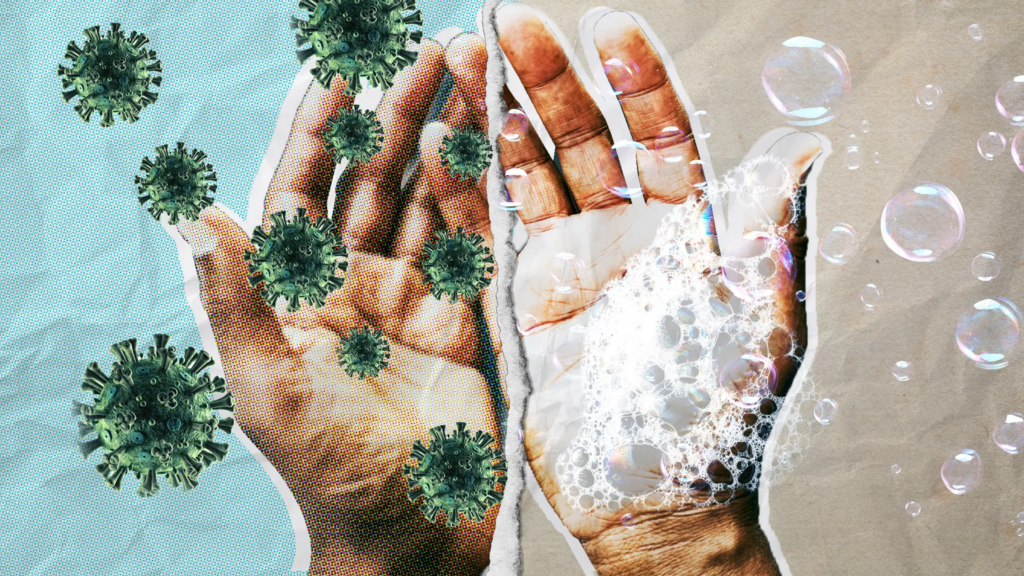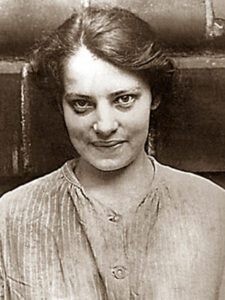Wash Your Hands! Have you ever wondered who is responsible for this important sanitary practice? It is none other than Florence Nightingale. Florence Nightingale pioneered in many fields including nursing, statistics, sociology, and philanthropy, and was one of the first to utilize evidence-based research. This is her story of discovery.
The Crimean War started in October of 1853. Florence Nightingale, known as the “Lady with the Lamp,” found herself working tirelessly to provide care for the wounded soldiers. During the Crimean War, medical facilities were not well equipped, hygiene was horrific, and the suffering of soldiers was evident. During this time, Nightingale encountered things that would haunt her forever. The hospital wards were overcrowded, there weren’t enough medical supplies, and at that time they lacked basic sanitation. With unwavering determination, Nightingale remained focused on her goals. She worked tirelessly to transform the military hospital into a place of healing. Despite the long hours, she remained positive and continued to be a beacon of hope for the soldiers in her care. Her presence brought comfort to her patients. Through her efforts, she transformed the military hospital into a place of healing and hope for all soldiers. Nightingale’s work during the Crimean War helped mitigate casualties. During this war, the British Empire was at war against the Russian Empire for control of the Ottoman Empire. The Crimean War lasted from October 1853 to February 1856.1
When Nightingale turned sixteen, it was clear that nursing was her passion. Nightingale expressed this passion to her parents, but they forbid her from pursuing this passion because of the way it looked for their daughter to pursue getting a job instead of the social norm, which was to get married to an affluent man and start a family.2
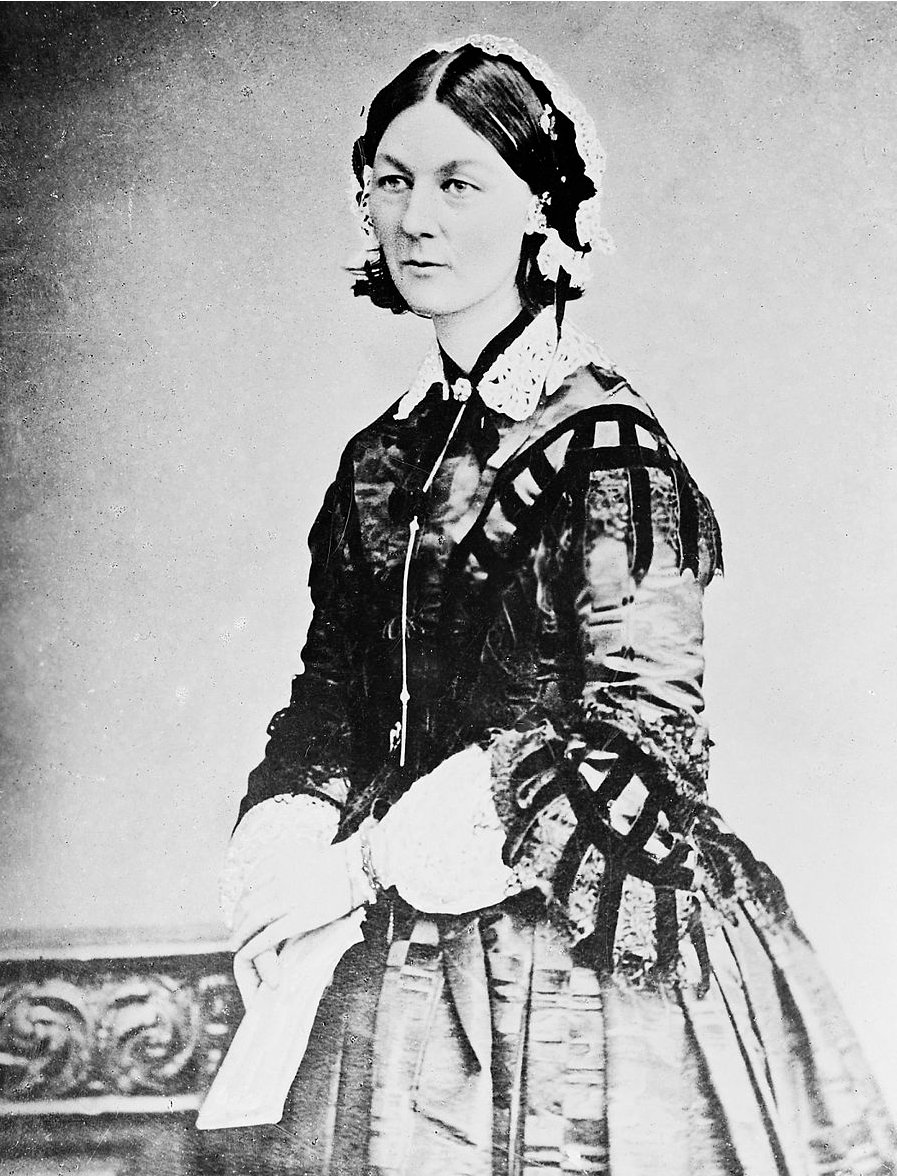
During the Crimean War, Nightingale was appointed superintendent of the Institution for the Care of Sick Gentlewomen in London. This appointment marked a significant milestone in Nightingale’s career. Nightingale’s main goal was to improve the quality of healthcare and nursing practices so that mortality rates would decrease, especially during the war.3
Florence Nightingale left her mark on nursing through her efforts to improve the quality of healthcare given to soldiers during the Crimean War. During the war, Nightingale organized and trained a group of 38 nurses who traveled to aid the soldiers during the conflict. Nightingale and her nurses traveled to Scutari, Turkey to care for soldiers. When they arrived, they were shocked by the lack of hygiene standards, lack of access to medicine, and the rapid spread of mass infections. They found hospitals with no beds or blankets, they found rats and fleas everywhere, and they found emaciated, and weak dying soldiers.4 They immediately implemented precautions like cleaning the rooms regularly, and Nightingale instructed her nurses to wash their hands often. Nightingale’s insistence on washing hands regularly and cleaning the rooms helped improve conditions greatly. Thanks to Nightingale, we now know that washing our hands is the best way to stop the spread of contagious diseases. 5
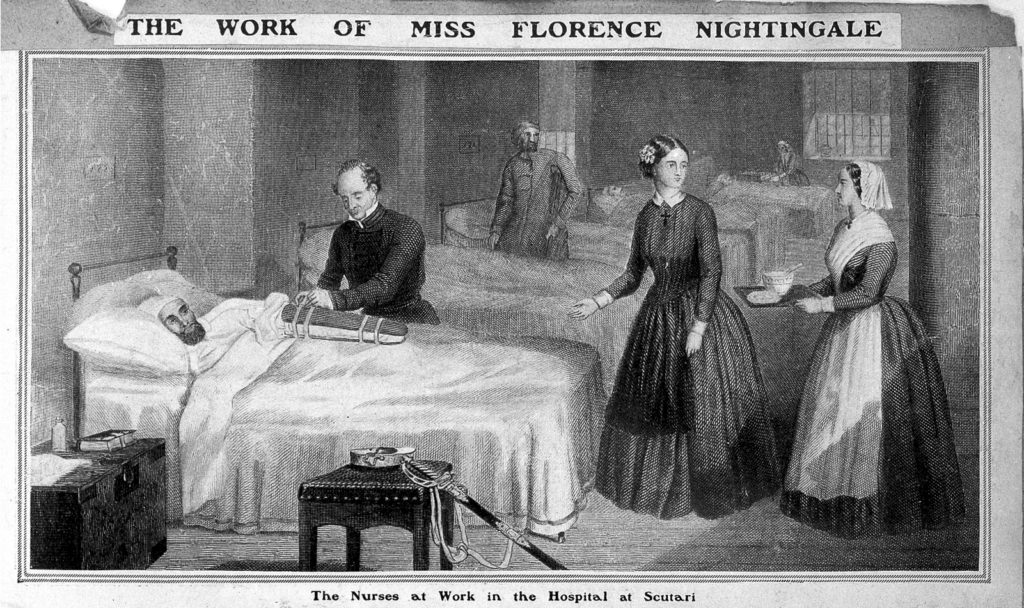
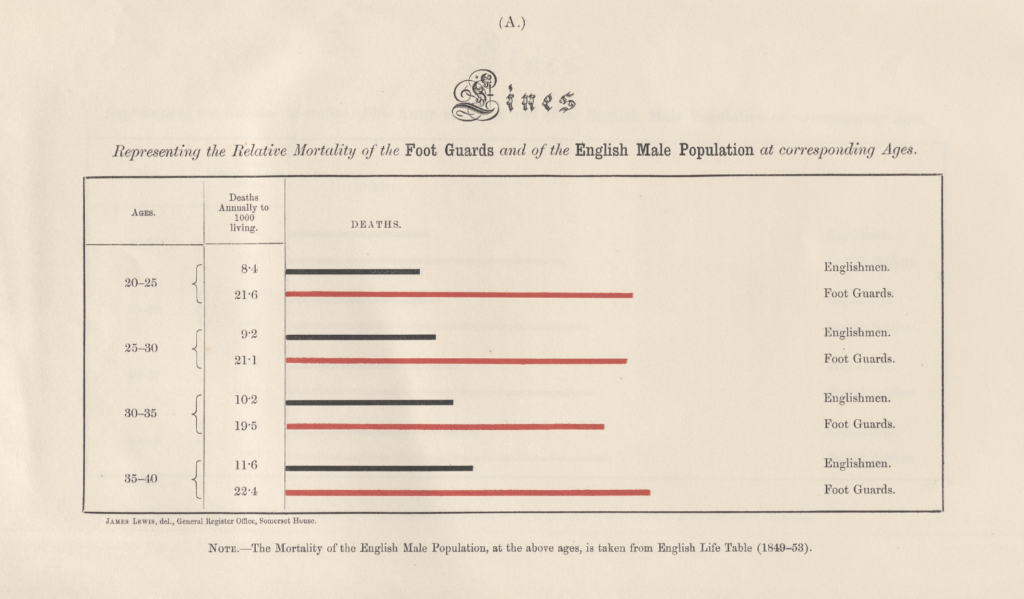
During the war, ten times more soldiers were dying from diseases than battle wounds. This resulted in Nightingale producing statistical charts to support her findings (see illustration). 6 The soldiers were poorly cared for, so Nightingale took it upon herself to ensure that she prevented more casualties from occurring. There were not enough showers for all the soldiers. The showers serviced over 2,000 soldiers and there were only fourteen showers. This caused infectious diseases to spread more quickly. The soldiers weren’t supplied with any soap or towels, so one of the things Nightingale did when she got to Scutari was purchase 200 Turkish towels. Later in the war, she supplied the soldiers with enough soap and clean shirts for all the soldiers. During this time, the British government even sent a Sanitary Commission to flush out the sewers and improve ventilation. Nightingale believed that the main problems in the military hospital were diet, dirt, and drains. In response to the diet problem, Nightingale brought food from England.7
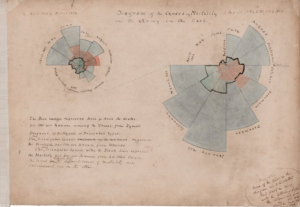
At night time, Nightingale would round on her patients to ensure they were all doing well. While she was rounding at night, she carried around a paper lantern. This is where Nightingale got the nickname “The Lady With The Lamp.” During her rounds at night, she would talk to her patients and offer them compassion in times when patients felt hopeless. When patients were dying, she would minister to her patients and comfort them in their final hours.8
Nightingale’s involvement in the Crimean War has revolutionized nursing, and it has helped elevate the profession. Her impact has changed the overall view of nurses. Nursing has gone from being a task performed by untrained individuals to a highly respected and vital profession. Nightingale witnessed firsthand the shortcomings of the military and civilian healthcare systems and she advocated for reformation so that sanitary conditions would be improved and soldiers would be well taken care of. 9
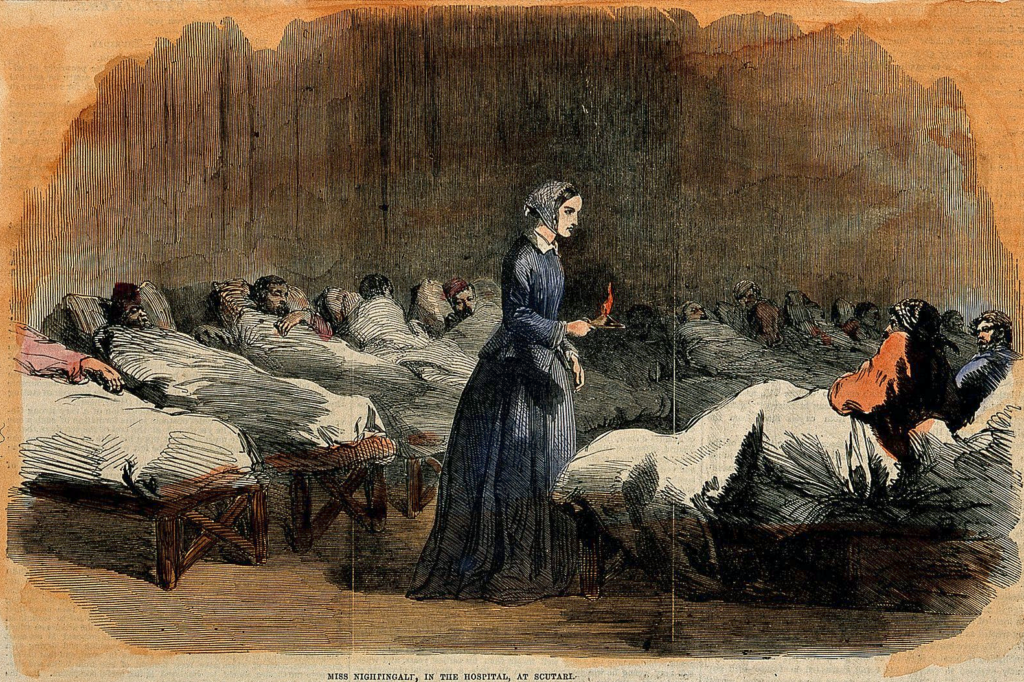
Nightingale’s involvement in the Crimean War was a defining moment in her life and career. She was deeply disturbed by the poor conditions and mortality rates during the war given that they weren’t war-related injuries. Her efforts during this time to improve sanitation, hygiene, and patient care solidified her reputation as a pioneering figure in nursing and healthcare. Nightingale accomplished most of her goals by establishing a training school for nurses, which brought a close to her contributions to nursing.
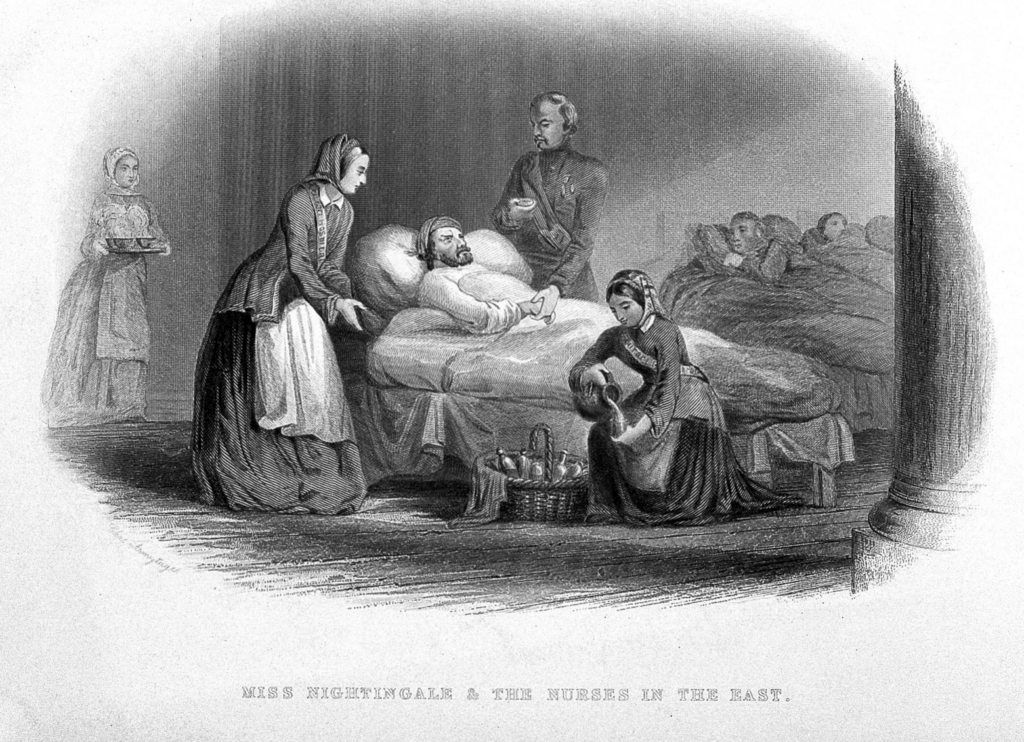
Every year, National Nurses Week begins on May 6th and ends on May 12th, which is Nightingale’s birthday. This week honors her and her advancements in nursing, making it the profession it is today.10 Nightingale’s efforts to change the healthcare system came with severe obstacles such as gender barriers, opposition from her family, especially her mother and sister, institutional resistance because they were very skeptical of her methods, and lastly, she faced several challenges during the Crimean War caring for wounded soldiers on the battlefield. As a primary figure in nursing, Nightingale has offered generations to come of nurses inspirational quotes to inspire creativity within the profession. Some memorable ones are listed here! 11
- “Never give nor take an excuse.” – Florence Nightingale
- “How very little can be done under the spirit of fear.” – Florence Nightingale
- “I use the word nursing for want of a better. It has been limited to signify little more than the administration of medicines and the application of poultices. It ought to signify the proper use of fresh air, light, warmth, cleanliness, quiet, and the proper selection and administration of diet–all at the least expense of vital power to the patient.” – Florence Nightingale
- “Every nurse ought to be careful to wash her hands very frequently during the day. If her face, too, so much the better.” – Florence Nightingale
- “If a nurse declines to do these kinds of things for her patient, ‘because it is not her business,’ I should say that nursing was not her calling. I have seen surgical ‘sisters,’ women whose hands were worth to them two or three guineas a-week, down upon their knees scouring a room or hut because they thought it otherwise not fit for their patients to go into. I am far from wishing nurses to scour. It is a waste of power. But I do say that these women had the true nurse-calling—the good of their sick first, and second only the consideration of what it was their ‘place’ to do—and that women who wait for the housemaid to do this, or for the charwoman to do that when their patients are suffering, have not the making of a nurse in them.” – Florence Nightingale
- “Crimean War | Map, Summary, Combatants, Causes, & Facts,” Encyclopedia Britannica, March 28, 2024, https://www.britannica.com/event/Crimean-War. ↵
- Amanda Onion, “Florence Nightingale – Biography, Facts & Nursing,” HISTORY, April 24, 2023, https://www.history.com/topics/womens-history/florence-nightingale-1. ↵
- Amanda Onion, “Florence Nightingale – Biography, Facts & Nursing,” HISTORY, April 24, 2023, https://www.history.com/topics/womens-history/florence-nightingale-1. ↵
- “Florence Nightingale: The Pioneer Statistician | Science Museum,” Science Museum, n.d., https://www.sciencemuseum.org.uk/objects-and-stories/florence-nightingale-pioneer-statistician. ↵
- “Florence Nightingale’s Story and Legacy | British Red Cross,” British Red Cross, April 6, 2024, https://www.redcross.org.uk/stories/health-and-social-care/health/how-florence-nightingale-influenced-the-red-cross. ↵
- Rj Andrews, “How Florence Nightingale Changed Data Visualization Forever,” Scientific American, February 20, 2024, https://www.scientificamerican.com/article/how-florence-nightingale-changed-data-visualization-forever/. ↵
- Elizabeth Fee and Mary Garofalo, “Florence Nightingale and the Crimean War,” American Journal of Public Health (1971) 100, no. 9 (September 1, 2010): 1591, https://doi.org/10.2105/ajph.2009.188607. ↵
- Dethorne, “‘The Lady With the Lamp’ and Her Contributions to Modern Nursing – UT Health Science Center Library,” UT Health Science Center Library, February 28, 2018, https://library.uthscsa.edu/2015/02/the-lady-with-the-lamp-and-her-contributions-to-modern-nursing/. ↵
- Gayle Morris, “Florence Nightingale: Her Impact on Nursing and Colonialism,” NurseJournal.org,” https://nursejournal.org/articles/facts-about-florence-nightingale/. ↵
- “History of National Nurses Week | American Nurses Association,” ANA, October 19, 2017, https://www.nursingworld.org/education-events/national-nurses-week/history/. ↵
- “50 Florence Nightingale Quotes | NURSING.com,” n.d., https://blog.nursing.com/florence-nightingale-quotes. ↵
